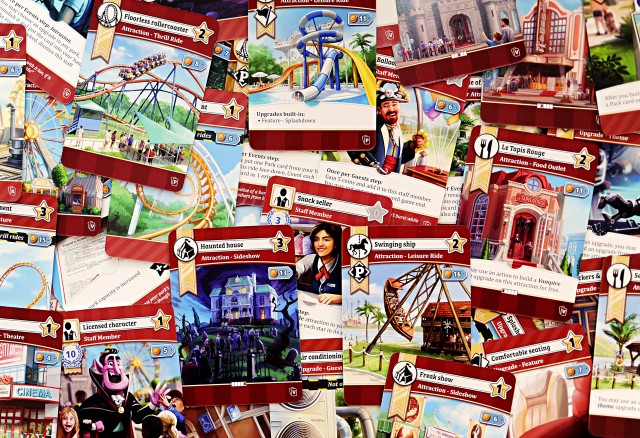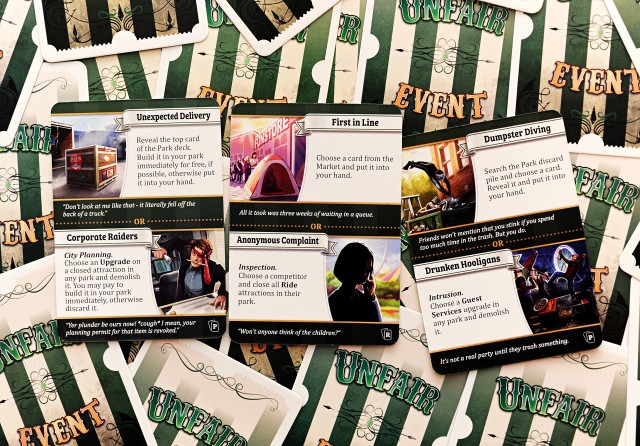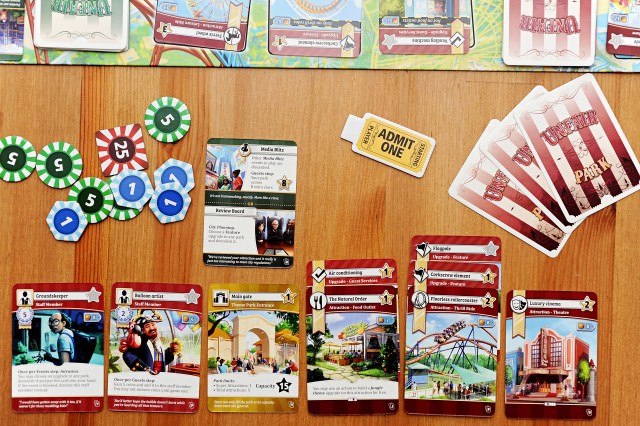In real life, I’m sure building a theme park is a lot of hard work. You’d have to wade through piles of red tape, make sure you had insurance for pretty much everything conceivable, and you’d probably be too tired at the end of the day to even enjoy your own rides. Life is just Unfair, isn’t it? Luckily building a tabletop amusement park is a heck of a lot of fun.
That was kind of the idea behind Unfair by Good Games and CMON. Building a theme park is great, but when there’s competition in town and unpredictable events keep happening, you have to plan your designs carefully and be ready to roll with the punches.
Unfair is played out over eight rounds, kept track of by the City deck. The bulk of the action takes place on the brilliantly designed (I’ll get in to that more later) central board. There are places for the City cards, Event cards, and six slots for a face-up Market of Park cards.
 The goal is to build the coolest and, thus, most profitable amusement park. Each player gets three actions to build or improve attractions, hire staff, collect Event cards, or acquire Blueprint cards (worth points if completed, but punishment if failed).
The goal is to build the coolest and, thus, most profitable amusement park. Each player gets three actions to build or improve attractions, hire staff, collect Event cards, or acquire Blueprint cards (worth points if completed, but punishment if failed).
At the end of each round the parks get scored, earning money for the guests they’ve been able to attract. You start off with a lowly Main Gates, but it won’t be long before you’re able to start adding attractions.
The rounds begin with each player drawing an Event card, followed by flipping a City card. In the first four rounds the City card is usually something that will positively affect some or all of the players. However, in the final four rounds, the reality of Unfair sets in and the City cards are generally something that will challenge and punish the players. Everyone will then get a chance to play out as many of those Event cards as they like. Event cards usually come with a choice – you can use them to take an advantage for yourself or they can act as an attack on another player. Once everyone has played all the Event cards they want and have passed, we move on to the Park phase. This is where the  real building of your parks will get done. In turn each player will get to do one of four different actions. You can draw cards, taking either one card from the Market layout and adding it to your hand or drawing two cards from either the Park, Event, or Blueprint deck. You’ll keep one of the cards and discard the other. You can build or add a card, either from your hand or the Market, paying its cost to place it in your park. Attractions and Upgrades will go to the right of your main gates, Employees will go to the left and your park will slowly take shape in front of you. Sometimes you have to tear down to build up and a third option on your turn is to demolish a card in your park. At times it just makes sense to get rid of an Upgrade or an Employee. The last option you have on your turn is a bit of a desperate act, but sometimes you just need the money. You can choose the Loose Change action to scour the grounds beneath your rides for change that has fallen from your customers’ pockets, picking up a dollar for each ride you have in the park.
real building of your parks will get done. In turn each player will get to do one of four different actions. You can draw cards, taking either one card from the Market layout and adding it to your hand or drawing two cards from either the Park, Event, or Blueprint deck. You’ll keep one of the cards and discard the other. You can build or add a card, either from your hand or the Market, paying its cost to place it in your park. Attractions and Upgrades will go to the right of your main gates, Employees will go to the left and your park will slowly take shape in front of you. Sometimes you have to tear down to build up and a third option on your turn is to demolish a card in your park. At times it just makes sense to get rid of an Upgrade or an Employee. The last option you have on your turn is a bit of a desperate act, but sometimes you just need the money. You can choose the Loose Change action to scour the grounds beneath your rides for change that has fallen from your customers’ pockets, picking up a dollar for each ride you have in the park.
The board is designed really well. Cards on either side of the board face inward, so no matter where you’re sitting, some cards will be facing your way instead of the board being completely upside down for one side of the table. The tracker down the middle of the board allows you to easily keep a tally of where you are in the round. Little details like this keep Unfair moving at a good pace and while there’s tough decisions to make, it never feels like it’s dragging. There are some nice little Easter Eggs hidden in the art as well that you’ll have fun discovering as you play.
There are a lot of different ways to focus on earning points in Unfair. Picking up Blueprint cards gives you some set goals like upgrading a certain type of Attraction three times or having a ride with a specific theme attached. It’s worth points to complete those Blueprints, but you’ll lose points if their requirements haven’t been met. You can focus on building up your parks bigger and better and earn points that way. Even some of your employees will earn you points.
If you notice someone pulling away from the pack you may want to form a tentative alliance with some of your opponents and start attacking with your event cards. For example, the Corporate Raiders card may force another player to discard an Upgrade on an Attraction or you can make an Anonymous Complaint and have all of their Ride Attractions closed for the round. Unfair starts off pretty friendly, but it’s not long before you’re forced to start playing a lot more cutthroat!
Throughout the rounds you can take a loan at any time. A quick cash infusion can really help your prospects, but the more money you take, the more points it’s going to cost you at the end of the game…oh yeah and there’s no way to pay the loans back. Did I mention this game is called Unfair?
After eight rounds you’ll score one final time and then receive or lose points for your completed Blueprint cards, Attractions, money and certain staff members. Attractions are scored based on how well you pimped them out during the game. A roller coaster that has comfortable seating, air conditioning, a batwing feature, and restrooms will do a lot better than one not so decked out. Each new feature that an Attraction has will make it exponentially more valuable.
 Now, on its own, the idea of building your own theme park with rides, staff, and attractions sounds really cool, but I haven’t even mentioned the different theme decks. The base game will come with four different themes; Pirates, Vampires, Robots, and Jungle. You create each game you play by adding Park, Event, Blueprint, and City cards from one faction per player in the game. A three player game could have Pirates, Jungle, and Robot themes for example. The art for all of the different sets is excellent and totally the right combination of playful with just a touch of the sinister. There are plans to release more and more theme decks to expand upon the combinations you can create in the game. If you were a fan of theme parks as a kid, as I was, you’ll recognize some of the typical tropes. It feels like you are being taken back to the excitement of your youth walking the grounds of Disney World (or Canada’s Wonderland).
Now, on its own, the idea of building your own theme park with rides, staff, and attractions sounds really cool, but I haven’t even mentioned the different theme decks. The base game will come with four different themes; Pirates, Vampires, Robots, and Jungle. You create each game you play by adding Park, Event, Blueprint, and City cards from one faction per player in the game. A three player game could have Pirates, Jungle, and Robot themes for example. The art for all of the different sets is excellent and totally the right combination of playful with just a touch of the sinister. There are plans to release more and more theme decks to expand upon the combinations you can create in the game. If you were a fan of theme parks as a kid, as I was, you’ll recognize some of the typical tropes. It feels like you are being taken back to the excitement of your youth walking the grounds of Disney World (or Canada’s Wonderland).
Unfair is a tableau builder, with a light-feeling theme that belies what a well balanced and interactive puzzle it is. Each player is forced out of their comfort zones with City cards that affect everyone at the table. You have many different ways to earn points and the park you build will feel unique to you. It’s the type of game you’ll be dissecting for days after and (at least in my case) want to play again, and often.
Comments
No comments yet! Be the first!